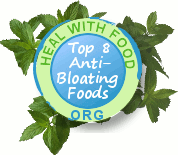8 Best Foods to Eat to Reduce Bloating and Gas

Learn how you can fight bloating and keep your belly flat and happy by eating the right foods! From ginger and peppermint to ripe bananas and pineapple, the spectrum of food remedies for bloating and gas is wide and varied. Here's a list of the 8 best anti-bloating foods to help you get started.
#1: Ginger
Ginger, one of the oldest spices in the world, is known to have been used in China as early as 400 B.C. Although probably best known for its cold and flu treating powers, ginger is also well known for its ability to alleviate symptoms of gastrointestinal distress and is commonly used for eliminating intestinal gas and reducing bloating.
Ginger contains zingibain, a protein digestive enzyme, and is therefore particularly effective at reducing bloating and gas caused by protein rich foods. Fresh ginger, which is said to be the most effective form of ginger, is available in the produce section of supermarkets throughout the year.
#2: Pineapple
Turbo-charge your anti-bloating diet by regularly eating pineapple. In addition to supplying a fair amount of potassium (which is a key component of any anti-bloat diet), pineapple contains bromelain. Bromelain is an enzyme that aids in the digestion of proteins. Be aware, however, that most of the bromelain in pineapple is in the stem which is not as tasty as the flesh but which is nevertheless edible.
#3: Peppermint
Naturopaths have long been recommending peppermint for bloating. Peppermint has a relaxing effect on the smooth muscles of the digestive tract, thus allowing the body to rid itself of digestive gas. One study conducted in Italy found that 75% of the test subjects with an irritable bowel syndrome (IBS) had a significant reduction in their IBS symptoms after taking peppermint oil capsules for four weeks. IBS is a common syndrome characterized by bloating, abdominal cramping and pain, constipation and diarrhea.
#4: Papaya
Originally from Central America, the papaya plant is today cultivated in most tropical countries. Termed as the "fruit of the angels" by Christopher Columbus, papaya is a true nutritional powerhouse. It is also a great food to add to your diet if you suffer from digestive complaints such as bloating. Papaya contains papain, a protein-digesting enzyme, as well as a number of other active compounds that can fight bloating. Green unripe papaya typically provides more papain than ripe papaya. Green papaya, which is often more readily available in Asian food stores, makes a nice addition to salads.
#5: Ripe Bananas
Too high an intake of salt is one of the most common causes of water retention around the abdominal area. Foods rich in potassium, such as bananas, help combat bloating caused by salty food. While salt attracts fluid into the cells, potassium drives the water molecules out of the cells. When incorporating bananas into your anti-bloating diet, be sure to only eat ripe fruit — unripe bananas contain resistant starch which can cause wind and bloating.
#6: Celery
Celery, which is a natural diuretic, has for long been used to help relieve water retention. When buying celery, opt for organically grown produce whenever possible — together with bell peppers celery tops the list of vegetables that contain the highest levels of contaminants, including neurotoxic pesticides and the potentially carcinogenic substance chlorothalonil.
#7: Cultured Natural Yoghurt
Cultured natural yoghurt typically contains Lactobacillus acidophilus and/or Bifidobacterium bifidum (or L. acidophilus and bifidum, for short). These probiotic bacteria live in the gastrointestinal tract where they aid digestion and fight the overgrowth of harmful bacteria, thereby preventing bloating. Increasing your intake of probiotic bacteria may be particularly helpful if you have recently been taking an antibiotic medication as antibiotics are known to destroy the healthy flora in the intestines.
#8: Fennel Seeds
Fennel seeds have been used for centuries to stimulate digestion and relieve bloating. The key active constituent in fennel seeds is the terpenoid anethole which has been shown to inhibit spasms in smooth muscles, including those in the intestinal tract. With their mild, anise-like flavor, fennel seeds are used in many different types of dishes around the world. In northern and central Europe, they are used in baking, particularly in breads. In Italy, fennel seeds are often added to sausages and meat dishes. In India, fennel seeds are one of the ingredients of panch poran, a spice blend which is used to flavor curries. Note: Pregnant women are advised to avoid consuming fennel seeds in larger quantities.
Also Inside This Guide
Further Reading (Offline)
 Amazon.com
Amazon.com Amazon.co.uk
Amazon.co.uk











